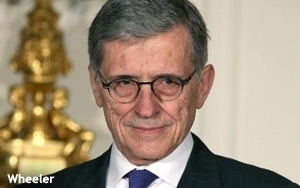
Federal Communications Commission Chairman Tom Wheeler intends to propose that the agency revise the definition of broadband to Web connections offering speeds of at least 25 Mbps downstream and 3
Mbps upstream.
The current definition of broadband is of Web connections of at least 4 Mbps downstream and 1 Mbps upstream. The new, faster standard “would update the definition of broadband
to reflect current consumer demands, deployment trends, and technological advances,” the FCC says in a summary provided to Online Media Daily of the agency's upcoming annual report on
the state of broadband deployment.
That report also will conclude that broadband isn't being deployed in a "reasonable and timely fashion," especially in rural parts of the country.
Overall, almost one in five Americans (17%) lack access to connections at speeds of at least 25 Mbps, according to the FCC. In rural areas, high-speed broadband is even scarcer, with 53% of rural
Americans lacking access to broadband connections of a least 25 Mbps. That speed is fast enough to download a 6-gigabyte movie in 16 minutes, according to a separate report issued late last year by
the Commerce Department.
advertisement
advertisement
The FCC notes in a three-page summary of its upcoming report that people increasingly are purchasing connections of at least 25 Mbps. In 2013, 29% of consumers living
in areas where that service was available adopted it, up from just 7% in 2011.
Even where Internet service of 25 Mbps exists, consumers don't have many choices about their providers, the
Commerce Department said late last year. Just 37% of U.S. residents have a choice of two or more broadband providers offering 25 Mbps connections, according to the Commerce Department.
Some
broadband advocates have long argued that the FCC should redefine broadband as Internet speeds of at least 25 Mbps. The organization Public Knowledge wrote in a filing last year that the 25 Mbps
standard will insure that “average households have adequate capacity for online video and other applications.”
A spokesperson for the organization said today that a redefinition
upwards “can boost the broadband economy, including online content.”
“There's a chicken-and-egg problem with broadband, where high speeds beget applications that can use
those speeds, but many people won't subscribe to higher speeds until the applications exist,” the spokesperson said in an email to Online Media Daily.
Much of the current demand
for faster connections seems driven by the availability of streaming video, which is now the dominant broadband application, according to the FCC.
Internet service providers are likely to
weigh in against a redefinition of broadband, given that some already are on record as opposing a more modest FCC proposal to redefine broadband as speeds of 10 Mbps downstream.
“The
Commission suggests that raising the threshold may be necessary due to increased usage of Internet applications and devices,” the industry group National Cable and Telecommunications Association
said in an FCC filing last year. “It is true that usage is increasing, but this increased usage has not changed the nature of voice, data, and video traffic or the capability required to handle
that traffic.”